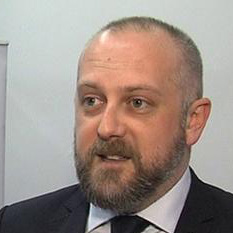German society - Organisation of Danube Swabians in Croatia, Osijek Deutsche Gemeinschaft - Landsmannschaft der Donauschwaben in Kroatien
+385 31213610
 Vladimir Ham Chairman
Vladimir Ham Chairman
The main program guidelines of the German Community's activities in Croatia are:
- Journalistic activity: four times a year the bilingual magazine "Njemačka riječ/Deutsches Wort" is published for all Germans and Austrians in Croatia,
- The scientific conference "Germans and Austrians in the Croatian cultural area", which gathers renowned Croatian scientists, historians and experts, who, through their research, shed light on historical facts about the merits of Germans and Austrians for Croatian culture, science, art... has been taking place for over 20 years,
- Every year, the collection of papers from the scientific symposium "Germans and Austrians in the Croatian Cultural Area" is also published as the "DG Yearbook",
- Every year a book of documentary importance for Germans and Austrians on the territory of Croatia is also published,
- The International Theatre Festival in German language, which gathers amateur theatre groups of all ages (kindergarten, primary and secondary schools to students) working in German language from Romania, Hungary, Slovenia, Vojvodina and Croatia, has been taking place continuously since 2001,
- The singing choir "Brevis-Danube" cultivates the German song through its repertoire,
- Various cultural events, concerts, exhibitions, excursions and other events take place continuously,
- Projects for the identification of the suffering sites of the Germans in this area. So far, monuments to the victims of the post-war death camps in Krndija, Zmajevac and the Valpovo camp have been erected,
- Great efforts are being made in the proceedings for restitution of the expropriated property of the Germans from this area in the post-war period,
- Equally great efforts are made in the field of preserving the German language (promotion of German language learning in schools, German language courses, German language competitions, etc.).
As an autochthonous national minority, the Germans have had the right to their representative in the Croatian Sabor (Parliament) since the foundation of the Republic of Croatia in 1990, and in the 2003-2007 legislative period the large group of 12 national minorities, including Germans and Austrians, was represented by Nikola Mak, a German. Since 2003, councils of the German national minority in the Osijek-Baranja County, the City of Osijek and the Municipality of Kneževi Vinogradi, as well as representatives in Split, Zagreb and Beli Manastir have been elected and are actively working. In this way the members of the German minority have the opportunity to actively participate in the work of local self-government.
The purpose and objectives of the work of the German Community -Landesmannschaft der Donauschwaben in Croatia can be summarized in some program guidelines:
- Clarification of historical facts concerning the contributions of Germans and Austrians on the territory of today's Croatia - in cultural, economic, political, religious and any other sense, as well as acquaintance of the Croatian public with these facts.
- To acquaint the Croatian public with the tragic fate of innocent German civilians who perished after World War II because they were declared by the communist regime to be collectively responsible for Nazi atrocities. Objectification of the role of Germans in Croatia before, during and after World War II.
- To acquaint the Croatian public with the situation and status of the Germans and Austrians - Danube Swabians after World War II until 1990.
- Assembly of the existing corpus of the Danube Swabians into the Association of the Volksdeutsche Gemeinschaft and creation of projects for this national minority.
- Assembly of the Youth - Descendants of the Danube Swabians through projects for young people and their encouragement in recognizing their own minority and cultural identity.
- Preservation of the cultural, linguistic and folklore traditions and customs of the Danube Swabians on the territory of Slavonia and Baranya.
- Efforts to introduce or improve the German language in kindergartens, primary and secondary schools and faculties. The German language should regain its deserved place on the territory of Eastern Croatia, on an equal footing with the English language, because the knowledge of the German language, besides the English language, is an important factor of future economic progress, not only for individuals but also for the whole region. The German language is a historical tradition of Slavonia and especially the city of Osijek.
German Community - Landsmannschaft der Donauschwaben in Croatia is member of the FUEN since 2011.
German minority in Croatia
THE DONAUSCHWABEN IN CROATIA TODAY
The largest number of them is gathered in the German Community - Landsmannschaft der Donauschwaben in Kroatien - with the seat in Osijek and branches in Zagreb, Split, Đakovo, Valpovo, Slavonski Brod, Požega and numerous Baranja villages. The Volksdeutsche Gemeinschaft in Osijek is a civic association which gathers members of the German and Austrian national minority, founded in 1992 in Zagreb. In 1996 the association and the management were transferred to Osijek. The German Association is still the most active German Association in Croatia, with around 1300 members and has published numerous written works, both scientific and literary.
The Germans in Croatia have a very long and successful history. They have built a lot and had a great influence on the culture, customs, architecture and language. Today there are about 3000 declared Germans in Croatia, although it is estimated that between 30 and 40 thousand people have a German background, but do not declare themselves as Germans.














